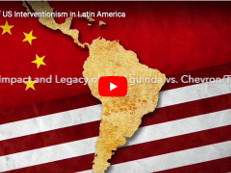Posted in Lecture Videos, Week 6 Lecture | Tagged with affect, Argentina, Brazil, C19th, discourse, gender, history, liberalism, race, rights, slavery, women
Having studied the French revolution and the Napoleonic empire for the last two years I was excited to find out what had happened in the Spanish and Portuguese colonies beyond my limited knowledge that they had sought independence shorty after Napoleon’s victory. However, I was sad to learn that in the case of Brazil this was done in an effort to avoid the abolition of slavery. Whilst it was not uncommon during the period for the elites to favour slavery as it benefitted them greatly, in all the revolutions I had previously studied the poor so greatly outnumbered the rich it was possible for them to overthrow the regime. Therefore, I was disheartened to learn how during a time of global revolution liberalism was crushed in Brazil in favour of the arguably dated idea of a constitutional monarchy.
After reading José Martí’s “Our America” a concept that particularly stood out for me was governing specifically for the place being governed. It is the familiar idea that no one size fits all but having read this passage it made me think of governments today and how instability arises because the government does not act in the best interests of the people. Martí’s other point that “those unacquainted with the rudiments of politics should not be allowed to embark on a career in politics” particularly resonated with me given the upcoming US election. I believe that Martí’s commentary on governments is still relevant in today’s political climate and that without the support of the people and a competent leader nothing but instability will ensue.
The third point of Martí’s that particularly interested me was that of placing more importance on studying the history of the region you are in than studying that of Europe. I found this especially interesting given recent discussions in the UK over the whitewashing of history taught in schools. In the phrase “our own Greece is preferable to the Greece that is not ours; we need it more” Martí’s highlights that both America and Greece are equal which was not the view of the European colonisers and that the people of Latin America deserve to hear the history of their ancestors over a history they have no relation to. I believe this is still a problem today with children all around the world focusing on European history over their own national history and agree with Martí’s that European history should not be valued higher than the history of any other region.
Discussion questions:
Do you think history taught in schools should include more global history or national history?
What history did you study when you were at school?
Posted in Blogs, Week 4 | Tagged with Brazil, Jose Marti, Our America
Having studied the French revolution and the Napoleonic empire for the last two years I was excited to find out what had happened in the Spanish and Portuguese colonies beyond my limited knowledge that they had sought independence shorty after Napoleon’s victory. However, I was sad to learn that in the case of Brazil this was done in an effort to avoid the abolition of slavery. Whilst it was not uncommon during the period for the elites to favour slavery as it benefitted them greatly, in all the revolutions I had previously studied the poor so greatly outnumbered the rich it was possible for them to overthrow the regime. Therefore, I was disheartened to learn how during a time of global revolution liberalism was crushed in Brazil in favour of the arguably dated idea of a constitutional monarchy.
After reading José Martí’s “Our America” a concept that particularly stood out for me was governing specifically for the place being governed. It is the familiar idea that no one size fits all but having read this passage it made me think of governments today and how instability arises because the government does not act in the best interests of the people. Martí’s other point that “those unacquainted with the rudiments of politics should not be allowed to embark on a career in politics” particularly resonated with me given the upcoming US election. I believe that Martí’s commentary on governments is still relevant in today’s political climate and that without the support of the people and a competent leader nothing but instability will ensue.
The third point of Martí’s that particularly interested me was that of placing more importance on studying the history of the region you are in than studying that of Europe. I found this especially interesting given recent discussions in the UK over the whitewashing of history taught in schools. In the phrase “our own Greece is preferable to the Greece that is not ours; we need it more” Martí’s highlights that both America and Greece are equal which was not the view of the European colonisers and that the people of Latin America deserve to hear the history of their ancestors over a history they have no relation to. I believe this is still a problem today with children all around the world focusing on European history over their own national history and agree with Martí’s that European history should not be valued higher than the history of any other region.
Discussion questions:
Do you think history taught in schools should include more global history or national history?
What history did you study when you were at school?
Posted in Blogs, Week 4 | Tagged with Brazil, Jose Marti, Our America
First of all, my favourite thing from this week’s reading was learning more about Cuban history. Where I come from, Cuba is demonized for its socialist background, and therefore, we know very little about it. I studied Brazilian history throughout my entire academic life and still, I was surprised to discover what a great parallelContinue reading “Week 6: Citizenship and Rights in the New Republics”
Posted in Blogs, Week 6 | Tagged with Brazil, Cuba, New Republic, racism, Sem categoria, slavery




